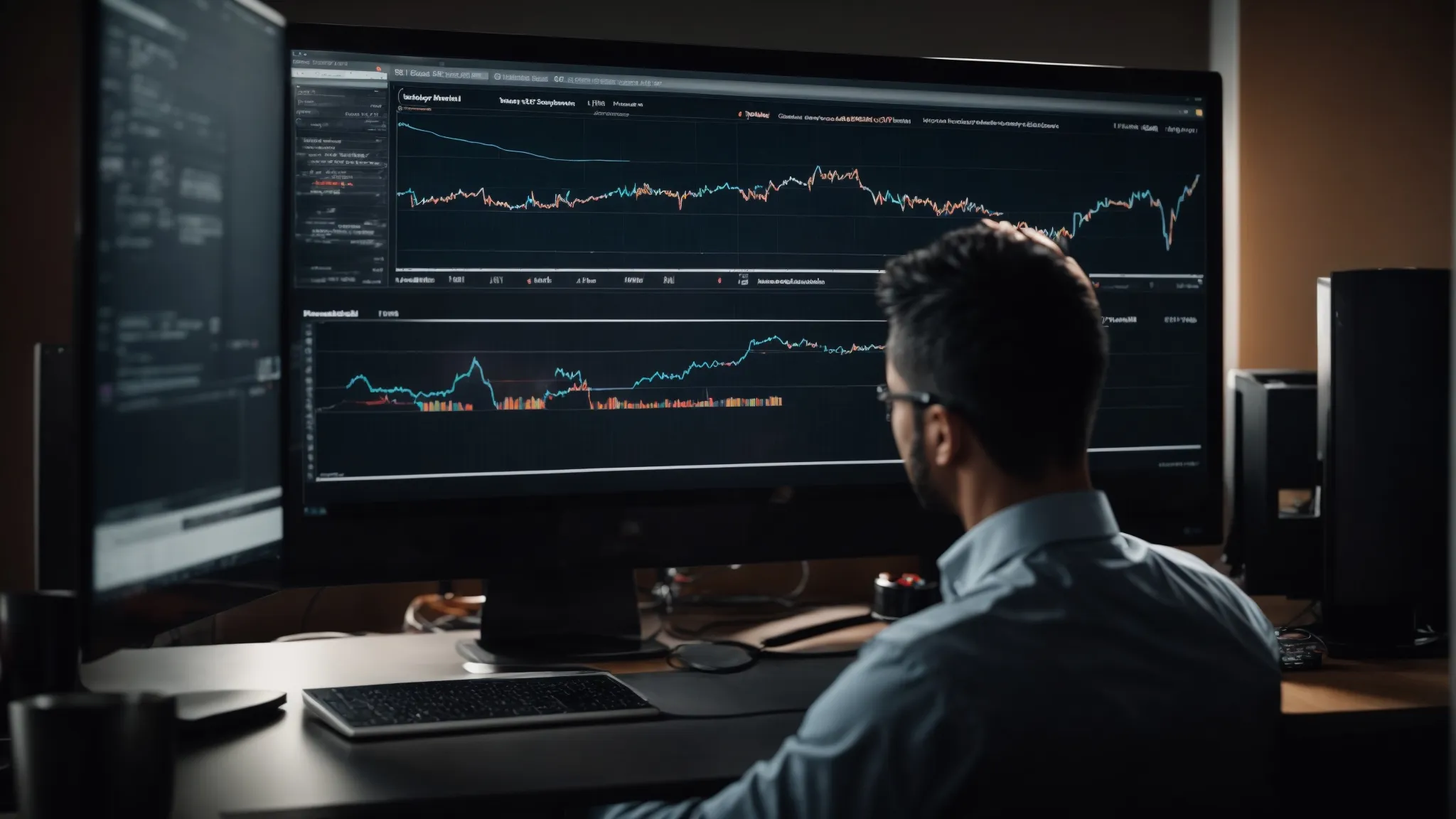Importance Learning Technical SEO 2
Mastering the Foundations: The Importance of Learning Technical SEO 2 In the intricate dance of search engine rankings, Technical SEO forms the backbone of any successful strategy, […]
Mastering the Foundations: The Importance of Learning Technical SEO 2
In the intricate dance of search engine rankings, Technical SEO forms the backbone of any successful strategy, yet remains an enigma to many.
It demands meticulous attention to detail, from the solid site architecture and efficient coding to ensuring seamless user experiences across devices.
Mastering Technical SEO components not only amplifies a website’s discoverability but also lays a foundation robust enough to withstand algorithmic shifts and the relentless evolution of digital trends.
Keep reading to unveil the core principles that will reinforce your site’s structure and guide you towards optimization supremacy.
Key Takeaways
- Technical SEO Is Essential for Enhancing Website Infrastructure and Improving Search Engine Visibility
- Key Components Such as Site Speed, URL Structure, and HTML Tags Play a Vital Role in Search Engine Ranking and User Experience
- Implementing Structured Data Like Schema Markup Can Significantly Enhance a Site’s Presence on SERPs
- Regular Technical SEO Audits Are Crucial for Maintaining and Improving a Website’s Performance in Search Rankings
- Ongoing Education and Adaptation Are Imperative for SEO Professionals to Keep Up With Algorithm Changes and Industry Best Practices
Demystifying Technical SEO for Better Site Optimization

The realm of Technical SEO is a cornerstone on which the edifice of online visibility is built, with its myriad elements underpinning the foundation of Search Engine Optimization strategies.
Mastering these critical components is essential for any organization seeking to ensure their website architecture facilitates not only seamless search engine crawling but also, and perhaps more importantly, optimizes user interaction.
This introduction paves the way to a deeper understanding of what Technical SEO entails and explores the key components that define its framework, showcasing the intricate balance between crawlability, indexing, rendering, and site architecture that are integral to any successful SEO project.
Understanding What Technical SEO Entails
Technical SEO refers to the process of optimizing a website’s infrastructure to facilitate ease of access and comprehension by search engines. It involves a strategic approach to enhancing a website’s ability to be crawled and indexed efficiently, ensuring that content is rendered properly on all devices and that the site structure supports optimal user navigation.
Embracing technical SEO requires an understanding of the various technical elements that search engines consider when ranking a site, such as site speed, URL structure, and the use of HTML tags. Professionals recognize the significance of these elements and deploy them judiciously to construct a robust foundation for a website’s long-term search engine performance:
| Technical Component | Purpose | Impact on SEO |
|---|---|---|
| Site Speed | Enhances user experience by reducing page load times | Directly impacts rankings as search engines prioritize speed |
| URL Structure | Clarifies the hierarchy and relevancy of content | Aids in the organization of site content for better crawler understanding |
| HTML Tags | Defines content structure for search engines and browsers | Facilitates content rendering and relevance signal communication |
Key Components Defining Technical SEO Framework
At the heart of Technical SEO, key components such as XML sitemaps and robots meta tags emerge as navigational guides for search engine spiders. These signals enable search engines to traverse the vast expanse of a website’s content landscape, ensuring that each valuable page stands a chance to be discovered and ranked accordingly.
Integral to the framework are also canonical URLs and hreflang attributes, which serve to diminish the detrimental effects of duplicate content and geo-targeting issues. By signaling the primary versions of similar pages and providing language-specific alternatives, these SEO elements work tirelessly to sculpt a site’s search engine presence with precision.
Why Technical SEO Matters in Modern Web Ecosystems

In the dynamic context of modern-day web ecosystems, technical SEO emerges as a pivotal facet of digital strategy, undergirding the functionality and reach of a brand’s online presence.
As the digital marketplace continues to evolve, the role of technical SEO in sculpting user experience and influencing search engine rankings becomes ever more pronounced.
A meticulously optimized technical framework not only delights visitors with a frictionless navigational experience but also aligns with the sophisticated algorithms of search engines to bolster the visibility of web pages.
Enhancing User Experience Through Technical SEO
Optimizing a website’s technical aspects is integral to refining the user experience, ensuring swift navigation, and maintaining engagement. Utilizing elements like page speed, mobile responsiveness, and clear navigation, Technical SEO Endeavors to create an environment where users interact with content effortlessly, encouraging prolonged sessions and reducing bounce rates.
Technical SEO paves the way for users to find answers to their queries with minimal hurdles by improving site architecture. A strategic approach to Technical SEO enhances a website’s user-friendliness, creating a positive perception that echoes beyond the immediate interaction and cements a brand’s credibility in the digital space.
The Role of Technical SEO in Search Engine Rankings
Technical SEO serves as a pivotal gear in the machine of search engine rankings, with its role in influencing the visibility of content on search engine result pages (SERPs). The meticulous optimization of technical elements, from site speed to secure connections, signals to search engines the quality and reliability of a website, thus positioning it favorably within the algorithmic calculations that determine ranking.
A well-executed technical SEO strategy aligns with search engine guidelines to facilitate the accurate indexing and relevant serving of web pages. By refining technical components such as efficient rendering and the removal of redirect chains, companies enable search engines to access and interpret site content effectively, placing their digital offerings high in the SERP hierarchy and captivating the target audience.
Breaking Down Technical SEO: Essential Elements to Master

In the quest to climb the search engine ranks and captivate the targeted audience, one must prioritize a firm grasp of Technical SEO, a realm where proficiency can spell the difference between obscurity and prominence.
Focusing on pivotal areas such as indexing and crawlability, one lays the groundwork for search engines to effectively navigate and assimilate a site’s offerings.
Similarly, the pursuit of excellence in site speed and mobile optimization is not just a nod to user preference but a critical factor that search engines weigh heavily.
Mastery of these elements stands as the litmus test for any SEO services provider intent on ensuring that client websites not only meet but exceed the rigorous standards set forth by today’s digital landscape.
Dive Into Indexing and Crawlability
Indexing and crawlability are the lifeblood of a well-optimized website, critical for ensuring that a site’s content is accessible to Search Engine Crawlers. Expanding these technical SEO elements enables search engines to include web pages in their vast databases, propelling them into the digital spotlight where they stand to attract valuable search traffic.
For entities eager to climb the search engine ladder, optimizing for indexing and crawlability is non-negotiable. Ensuring that technical barriers do not hinder the ability of Googlebot and other search engine spiders to crawl a site is integral, thereby solidifying a website’s presence in the search engine results and laying the foundations for increased visibility.
A Closer Look at Site Speed and Mobile Optimization
In the meticulously nuanced world of technical SEO, site speed stands as a non-negotiable metric, integral to a sterling user experience and search engine favorability. Quick page load times are not merely about instant gratification but play a crucial role in retaining visitors, reducing bounce rates, and consequently contributing to higher search engine rankings.
Equally vital is the aspect of mobile optimization, which caters to the ever-growing base of mobile users that frequent the digital marketplace. Websites honed for mobile responsiveness ensure accessibility across a variety of devices, thereby enhancing user experience and signaling to search engines the brand’s commitment to inclusivity and modern browsing practices.
Elevate Your SEO Game With Structured Data

In the complex labyrinth of Technical SEO, implementing structured data through Schema Markup represents a strategic lever to gain a competitive edge.
Tailoring website content with this form of metadata not only aids search engines in deciphering the context of information but also enhances the display of web pages on SERPs via rich snippets.
By integrating schema markup, entities enhance the potential for boosted organic click-through rates, fostering a direct and profound impact on a website’s visibility and user engagement metrics.
Implementing Schema Markup for Rich Snippets
Embedding schema markup into a web page equips search engines with a refined understanding of its content, influencing the way information is presented in search results. By articulating the specifics of the structured data to search engine crawlers, marketers can dictate more compelling, information-rich results that stand out amongst the plain listings.
When implemented effectively, these markers elevate the search presence to accommodate intuitive, action-inducing snippets that portray a precise glimpse of the content within: high-quality schema markup capitalizes on this opportunity, driving enhanced visibility and user engagement.
- Integration of schema markup imparts clarity to search engines regarding a page’s content.
- Structured data distinguishes search listings through information-rich snippets.
- Effective schema implementation can lead to heightened visibility and improved click-through rates.
Boosting Click-Through Rates With Structured Data
Structured data offers a transformative approach, elevating the user’s searching experience by transforming how information on web pages is indexed and presented. The precision with which content descriptions are paired with search queries translates to more satisfying click-through experiences, inducing higher engagement from search engine users.
Implementing structured data techniques such as schema markup provides a competitive advantage, leading to enriched search results which effectively highlight the most relevant aspects of content. This not only fulfills user intent more accurately but consequently encourages enhanced click-through rates, as users are more likely to interact with listings that clearly align with their informational needs.
Auditing Your Website for Technical SEO Health

Embarking on a Technical SEO audit represents a critical step for businesses to diagnose and fine-tune the underpinnings of their websites, ensuring peak performance in the digital terrain.
This investigative process casts a detailed gaze across various facets of website health, from the adeptness of on-page elements to the sophistication of backend functionalities.
As a prelude to the journey of comprehensive website examination, the subsequent discourse will provide insights into procedural steps for conducting a Technical SEO Site Audit, alongside an exposition of instrumental Tools to Aid in Technical SEO Auditing.
Engaging in these audits is not merely about uncovering the hidden intricacies of a website; it’s a strategic move to fortify the digital foundation upon which businesses are built.
Steps to Perform a Technical SEO Site Audit
Commencing a Technical SEO site audit necessitates a systematic approach, often initiating with a comprehensive examination of a website’s current state: an assessment of on-page SEO metrics, including page title relevancy and meta descriptions, ascertains foundational SEO health. A meticulous review of site architecture and URL structure also offers insights into the ease with which search engine crawlers navigate and understand website content.
| Technical SEO Element | Assessment Area | Objective of Analysis |
|---|---|---|
| On-Page Metrics | Titles, Descriptions, Content Optimization | To verify the effectiveness of on-page elements in signaling relevancy to search engines |
| Site Architecture | URL Structure, Navigation, Internal Linking | To assess the coherence and crawler-friendliness of website design |
| Technical Elements | Site Speed, Mobile Responsiveness, Technical Tags | To ensure that site performance is optimized for user experience and search engine guidelines |
Following the initial review, the auditor harnesses specialized SEO tools to delve deeper: scrutinizing technical aspects such as page speed, mobile responsiveness, and the proper employment of HTML code. Employing a robust site audit tool facilitates the identification of bottlenecks that impede site performance and user experience, potent in affecting search engine rankings.
Tools to Aid in Technical SEO Auditing
In the arsenal of a technical SEO specialist, an array of sophisticated tools stands ready to dissect and analyze a website’s technical health. These instruments, such as LinkGraph’s SearchAtlas SEO software, offer granular insights into site architecture, page load times, and on-page SEO factors, allowing optimizers to pinpoint and rectify deficiencies that could potentially hinder a site’s search engine performance.
These robust utilities serve not simply as diagnostics tools but as guides for ongoing optimization efforts. Having the capability for free SEO audits, backlink analysis, and monitoring of page speed, the SearchAtlas SEO software exemplifies the type of comprehensive digital tool that equips professionals to make data-driven decisions in their technical SEO endeavors:
- Employing a technical SEO audit tool to gauge site health across multiple dimensions.
- Utilizing free backlink analysis to understand and improve off-page SEO factors.
- Analyzing page speed metrics to ensure optimal user experience and search engine favorability.
Staying Ahead: Keeping Up With Technical SEO Updates

In the perpetually shifting terrain of search marketing, mastering the art of Technical SEO requires a commitment to continuous learning and nimble adaptation.
Professionals in the field understand that fostering an intellectual curiosity and constructing a disciplined routine for SEO knowledge enhancement are pivotal to staying relevant and competitive.
With search algorithms becoming increasingly complex and user demands steadily evolving, the onus is on SEO specialists to relentlessly pursue new insights and to integrate them into their strategies to ensure sustained success for their clients’ digital assets.
Continuous Learning and Adaptation in SEO
In the ever-evolving landscape of digital marketing, staying ahead in technical SEO is akin to navigating uncharted waters with a compass of perpetual learning. SEO professionals pivot their strategies as search engines refine their algorithms, ensuring that the content and technical aspects of their clients’ websites align with the latest guidelines and user behavior patterns.
Adaptation in SEO is not just about responding to changes; it’s about proactively anticipating them. Marketers who excel in this field do so by investing in the ongoing acquisition of SEO knowledge, enabling their skillset to evolve in tandem with the very algorithms they seek to master, and thereby securing the digital relevance of the brands they represent.
Building a Routine for SEO Knowledge Enhancement
For professionals devoted to the domain of search engine optimization, building a consistent routine for SEO knowledge enhancement is crucial. This practice involves dedicating time to explore the latest industry trends, algorithmic updates, and best practices, ensuring that one’s Technical SEO Strategies remain current and effective.
Establishing such a regimen allows SEO specialists at companies like LinkGraph to deliver results that resonate with the intricacies of modern search algorithms. Through regular engagement with leading SEO resources, attendance at webinars, and collaboration with peers, these experts maintain an edge in the dynamic world of digital marketing:
| Key Activity | Resource Type | Frequency | Impact on Skillset |
|---|---|---|---|
| Algorithm Update Analysis | SEO Blogs, Forums | Weekly | Ensures strategies align with latest search engine changes |
| SEO Tool Exploration | Software Webinars, Tutorials | Monthly | Equips with advanced capabilities in utilizing SEO software like SearchAtlas |
| Peer Collaboration | Conferences, Networking Events | Quarterly | Enhances understanding through shared experiences and case studies |
Conclusion
Mastering Technical SEO is crucial for ensuring a website’s visibility and usability in today’s competitive digital landscape.
By focusing on the foundational elements of crawlability, indexing, site speed, and mobile optimization, businesses can ensure their content is easily accessible and navigable for both search engines and users.
The use of structured data through schema markup further enhances the clarity and attractiveness of search engine listings, potentially improving click-through rates.
Regular technical SEO audits are essential for maintaining optimal website health, utilizing advanced tools for comprehensive analysis and staying current with SEO best practices.
Commitment to continuous learning and adaptation is paramount for SEO professionals to keep pace with algorithmic changes and evolving user behaviors, thereby delivering strategies that ensure sustained online success for the brands they manage.















































































